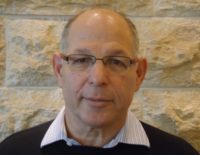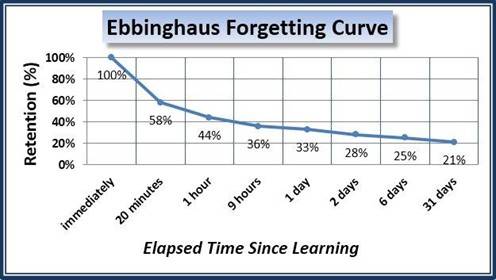Seizing the Opportunity to Close the Knowing-Doing Gap
Hermann Ebbinghaus proposed the “Forgetting Curve” back in the 1880’s, declaring that “we quickly forget most of what we learn unless we consistently apply it.” A recent Forbes article on trends in leadership development echoed his words, saying “If leaders aren’t doing it, they’re going to lose anywhere from 40 to 80% of what they encountered in learning and development programs.”
This grim reality is not lost on the 500+ Israeli public service leaders who studied leadership at Harvard as Wexner Israel Fellows or as Wexner Senior Leaders, nor on The Wexner Foundation team working to support them.
For many years, The Wexner Foundation addressed this problem, which may be referred to as the knowing-doing gap, through Alumni programs offering a combination of Harvard refresher courses and Alumni-led case studies and peer-learning opportunities. More recently, Wexner Israel Fellowship Alumni and Members of the Senior Leaders’ Network have come to focus more and more on collaborative initiatives, inspired by the Cross-Boundary Collaboration (XBC) methodology that takes center stage in the Wexner Senior Leadership program at the Harvard Kennedy School. However, the scope of these initiatives was always limited by the difficulty of getting busy public sector leaders to leave their desks and get into a room with other Alumni.
Enter the Coronavirus pandemic: along with the challenges, hardships and pain associated with it, the world is adapting and changing at a rate we could not even imagine previously. One such change is in our understanding of what it takes to bring people together. Virtual meetings, long considered an inferior form of convening and to be used sparingly, have taken over the way we work, communicate, collaborate and even socialize. While many of us miss the traditional face-to-face meetings and cannot wait to return to the “old normal,” it is clear that the virtual meeting is here to stay. Its time has come; the technology is here, the knowhow for running virtual meetings is widespread and necessity has made us comfortable with it. Bringing busy people together no longer requires bringing them to a physical gathering space.
Now let us see what has been done with this newfound capacity for virtual meetings. In the past, members of our Israeli Alumni communities could meet once a year in an institute and two or three times a year for a lecture, short field trip or panel discussion, usually around Passover or Hannukah. More recently, numerous professional forums emerged, filling a need for peer learning and consultation, as well as a desire to collaborate. They included, among others, a forum for HR professionals, another for welfare and social justice, a third focused on innovation and a forum for planning and strategy specialists. By the end of 2019, on the eve of the pandemic, a large portion of the Israeli Alumni and senior leaders’ community was engaged in activities of this kind and was becoming aware of their potential for closing the knowing-doing gap. But it is only now, many months into the COVID-19 pandemic, that we see this potential being fulfilled, as reflected in last November’s virtual schedule of joint Alumni/Senior Leaders’ community activities:
During November alone, the following Alumni activities took place:
- Four professional forums meeting for case study presentations and peer consultations.
- One (of an eight-part series) adaptive leadership workshop facilitated by four Alumni.
- One (of an eight-part series) Harvard faculty led Cross-Boundary Collaboration workshop.
- One mentoring program gathering.
- Two gender equity leadership events held jointly with North American Wexner Alumni.
- One Alumni-led session on maintaining emotional health during the pandemic.
- One meeting of professionals working on regional development challenges of the Galilee with a renowned Harvard professor.
- One case study presentation by Senior Leaders of an organizational learning strategy for timely evaluation and adjustment of public policy “on the move” during a crisis.
Looking back at the evolution of Alumni engagement, we can see continuous development and growth: first, there was learning with Harvard professors. Then, gradually, learning began to merge with doing. Peer learning was followed by peer consultation that led to collaboration. Responsibility for content, once fully in the hands of Foundation staff, is now shared. Alumni and Senior Leaders contribute to content, participate in delivery, propose collaborative initiatives and lead and participate in collaborative projects. From exercising leadership within their own organizations (in their day jobs,) they moved on to exercising collaborative leadership as a community. This may well have happened anyway, eventually, but the pandemic accelerated the process, while reaffirming Albert Einstein’s assertion that “in the midst of every crisis lies great opportunity.”
The opportunity which our Alumni saw and took, under the urgent demands of the pandemic, was to follow Les Wexner’s call for life-long learning and to go beyond it, toward eliminating the separation between learning and doing; they discovered that the challenges of a crisis of this scale forced them to try new solutions to unfamiliar problems, without the luxury of conducting the thorough studies that would precede implementation under normal circumstances. They turned to their fellow Alumni to share their experiences (good and bad) in leading through the pandemic, thus creating a learning environment focused on real and current problems and dilemmas. They closed the knowing-doing gap, and in all probability, this newly acquired tool of learning while doing is one that many of our Alumni will hold on to when life goes back to “normal.”

Get To Know The Author
Ra’anan Avital is Director General of The Wexner Foundation office in Israel.

